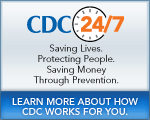What You Should Know and Do this Flu Season If You Are 65 Years and Older:
It has been recognized for many years that people 65 years and older are at greater risk of serious complications from the flu compared with young, healthy adults. It's estimated that 90 percent of seasonal flu-related deaths and more than 60 percent of seasonal flu-related hospitalizations in the United States each year occur in people 65 years and older. This is because human immune defenses become weaker with age. So influenza can be a very serious disease for people 65 and older.
Actions To Take This Flu Season
- Get Your Flu Shot
The best way to prevent the flu is with a flu vaccine. CDC recommends that everyone 6 months of age and older get a seasonal flu vaccine as soon as it becomes available in your community. Vaccination is especially important for people 65 years and older because they are at increased risk for complications from flu.
A flu vaccine protects against three different flu viruses: an H3N2 virus, an influenza B virus and an H1N1 virus. (See Vaccine Virus Selection for the upcoming season’s exact vaccine composition.) The vaccine has been updated for this season and immunity wanes over a year, so you should get vaccinated this year even if you vaccinated last season. Immunity sets in about two weeks after vaccination.
People 65 years and older have two flu shots available to choose from - a regular dose flu vaccine and a newer flu vaccine designed for people 65 and older with a higher dose. The high dose vaccine is associated with a stronger immune response to vaccination. However, whether the stronger immune response results in greater protection against influenza illness in older adults is not yet known. The CDC and its Advisory Committee on Immunization Practices have not expressed a preference for either vaccine. - Take Everyday Preventive Actions including covering coughs, washing hands often, and avoiding people who are sick.
- Seek medical advice quickly if you develop flu symptoms to see whether you might need medical evaluation or treatment with antiviral drugs. It's very important that antiviral drugs be used early to treat flu in people who are very sick with flu (for example, people who are in the hospital), and people who are sick with flu and have a greater chance of getting serious flu complications, like people 65 and older (see box for full list of high risk persons/conditions).
Flu symptoms include fever, cough, sore throat, runny or stuffy nose, body aches, headache, chills and fatigue. Some people may also have vomiting and diarrhea. People may be infected with the flu and have respiratory symptoms without a fever.
Contact Us:
- Centers for Disease Control and Prevention
1600 Clifton Rd
Atlanta, GA 30333 - 800-CDC-INFO
(800-232-4636)
TTY: (888) 232-6348 - Contact CDC-INFO



